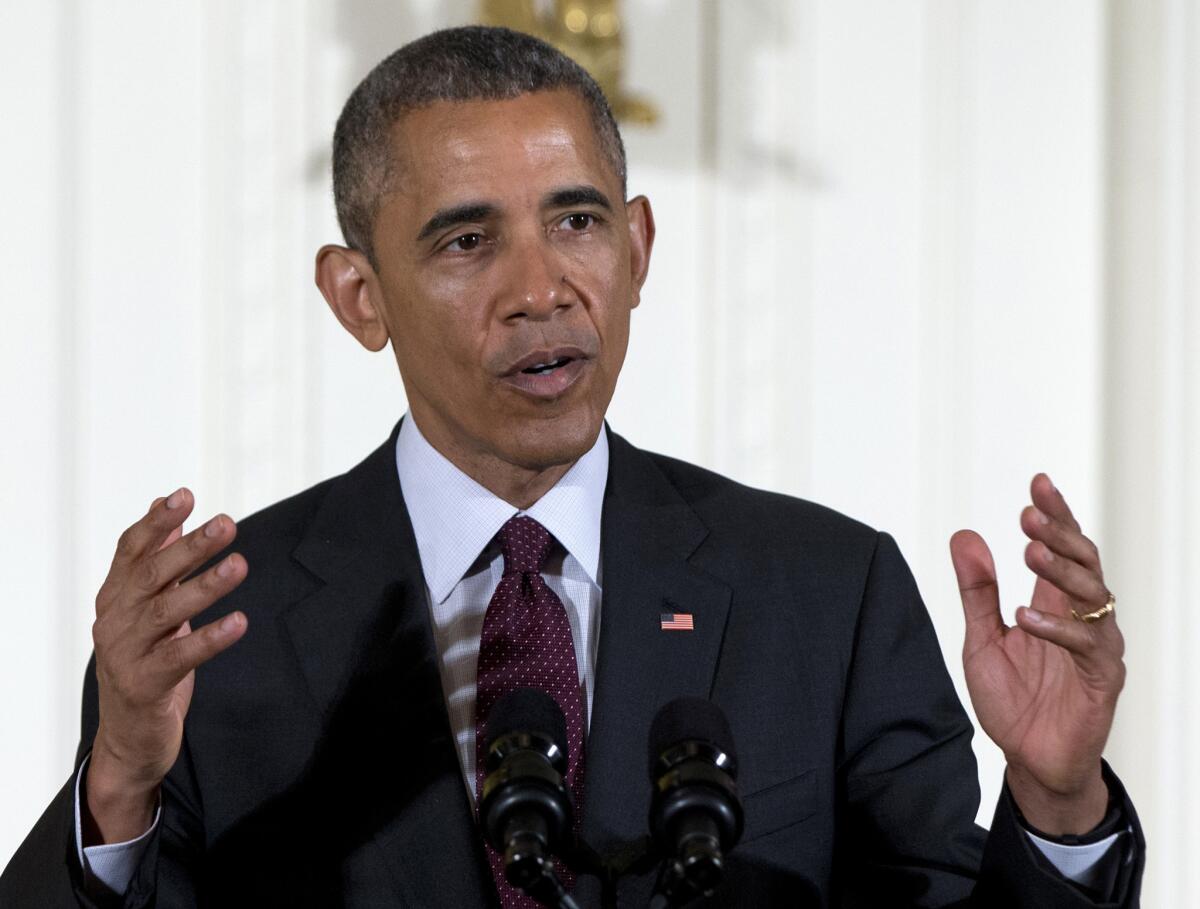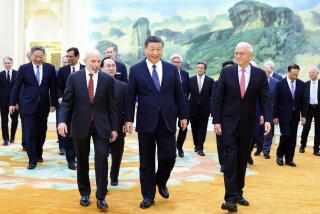Analysis: America seeks its way in a new economic world

President Barack Obama says China has made inquiries about potentially joining a Trans-Pacific trade agreement in the future. The agreement now involves the U.S. and 11 other Pacific rim countries and is the central goal of the contentious trade debate now unfolding in Congress.
The long, acrimonious legislative battle that ended Wednesday in a vote giving President Obama the power needed to complete trade agreements reflects the steady march of globalization and the nation’s deep fear that widening its economic engagement with the world will cost Americans jobs.
With the Senate’s 60-38 vote to pass legislation on trade-promotion authority, or fast track, the Obama administration now can turn to finishing negotiations on the Trans-Pacific Partnership, a legacy-making deal for the president that would join the markets of 12 Pacific Rim nations accounting for 40% of the global economy.
It will likely be year-end at the earliest before Congress has a final say on the accord. Lawmakers will not be allowed to amend the pact, and it’s by no means certain they will approve it.
“I do not believe the vote on TPP will be easy,” said Susan Schwab, a former U.S. trade representative in the George W. Bush administration. “That will be the next battle.”
History, though, is on Obama’s side: Every U.S. trade agreement presented to Congress by a president after winning fast track has eventually passed.
In that sense, the Pacific deal, while the biggest yet attempted, is part of a revolution set off by sweeping changes in technology, communications and transportation as well as in economic policy all around the world — changes that seem to go well beyond the power of any single government, political party or interest group to control.
“The reality is, in 2015, globalization is a fact of life,” said Sen. Ron Wyden (D-Ore.), a pivotal figure in swaying enough Democrats to support fast track, a measure that limits Congress to a simple yes-or-no vote on completed trade agreements.
Certainly the benefits of globalization are clear: “We have $10 T-shirts, $12,000 basic cars and $500 computers,” noted Robert Shapiro, a top economic advisor to President Clinton, who pushed through the North American Free Trade Agreement in 1993. “None of that would have been possible without globalization.”
But the costs are also clear: Hundreds of thousands of manufacturing and other jobs have moved overseas to countries where workers are paid less, have fewer benefits and exist on a lower standard of living.
Nor have the costs been confined to industrial workers.
Many white-collar jobs in law, medicine and accounting, to name a few, also are moving overseas as global education rates improve and the leveling influence of technology intensifies.
So when free-traders claim everyone has benefited from globalization, a growing chorus of trade critics says, “Not so fast.”
There’s evidence, for example, that China’s rise in the world trading system over the last two decades has had a significant effect on American jobs. Researchers at MIT and other institutions estimate that soaring import competition from China has resulted in a net loss of more than 2 million domestic jobs from 1999 to 2011.
Other economists say offshoring, or the moving of U.S. factories and jobs to other countries, also has contributed to broader wage declines for American workers.
Lingering frustration from the Great Recession, which has left many U.S. workers struggling, has raised those stakes even higher, spurring Democratic lawmakers to challenge their party’s own president over the trade deal.
Obama had just enough Senate Democrats in his corner to get to Wednesday’s vote, which came only after an initial rebuffing of the fast-track package by House Democrats earlier this month and considerable backroom dealing.
The intensity of the fight reflects an understanding that the Trans-Pacific Partnership, more than any other trade deal by virtue of its size and scope, will serve as a model for years to come. The pact includes Japan, Canada, Mexico and Vietnam, but officials see China, the Philippines and others potentially joining the U.S.-forged accord some day.
“Everybody sees the stakes being very high because the TPP is designed to be infinitely expandable,” said Thea Lee, the AFL-CIO’s deputy chief of staff. She acknowledged, however, that the odds are against those opposing the deal, noting that “once fast track is given, there’s no incentive to change course on TPP itself.”
Both Obama and his trade critics, including populist Sen. Elizabeth Warren (D-Mass.) and presidential candidates Bernie Sanders (I-Vt.) and, to a lesser degree, Hillary Rodham Clinton, insist that protecting American workers is their top priority.
To soften the hit for workers, many Democrats want Congress to extend federal retraining aid for those hurt by intensified foreign competition. Funding for that program, which economists consider inadequate, was initially tied to fast track but is now expected to move through Congress separately by the end of the week. Obama has said he hopes to sign both together.
Beyond that, Democrats hold vastly different perspectives on the Pacific trade deal. Obama and many others argue that it is imperative for the U.S. to chart the path of global trade rather than follow China or anybody else.
Tough issues involving sensitive farm and dairy products still have to be resolved, and negotiators also must set rules and standards on intellectual property, labor, environment and other areas related to trade and investment.
“The rest of the world is still waiting for the U.S. to show global leadership on trade, and it won’t be able to lead globally unless it succeeds regionally” with the Pacific Rim deal, said James Bacchus, a former Democratic House member from Florida and onetime chairman of the World Trade Organization’s appellate body.
Many others harbor deep reservations about some of the proposed contents of the partnership, which have been seen by lawmakers or leaked out from the secret talks.
Warren, for example, has sharply criticized a provision that would allow investors to sue governments over trade disputes and have them settled by an international panel — something that she and others warn will profit multinational firms by allowing them to bypass national courts.
Other critics say the Pacific deal will enrich big pharmaceutical makers and entertainment firms by expanding patent protections even at the expense of ordinary consumers.
“No one believes you can turn back the clock, but what the different stakeholders are doing is trying to shape the rules of the road in a way that would benefit them,” said Jared Bernstein, former chief economist for Vice President Joe Biden.
What remains unclear is whether those stakeholders will have power to shape or rewrite the economic rules.
As long ago as 1999 in Seattle, massive protests against globalization were mounted at a meeting of the World Trade Organization. The influence of the protests was marginal at best; the next year China joined the WTO.
Union leaders, consumer groups and others opposed to the Pacific deal are hoping for more lasting results this time. Once negotiations are completed, the fast-track legislation calls for the final trade package to be made public for 60 days before the president signs it and delivers it to Capitol Hill for a vote.
Whatever the outcome, “the United States is not withdrawing from globalization,” said Shapiro, the Clinton administration economist.
“Globalization is simply becoming more universal, broader. You don’t really have an option to say ‘no’ anymore. The option is, how do you get the largest number of your people to prosper through it?”
Follow me on Twitter at @dleelatimes
More to Read
Start your day right
Sign up for Essential California for news, features and recommendations from the L.A. Times and beyond in your inbox six days a week.
You may occasionally receive promotional content from the Los Angeles Times.







